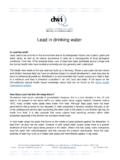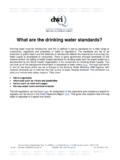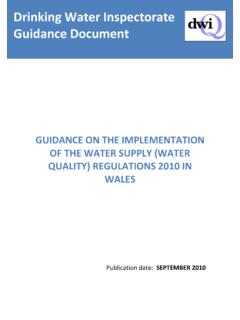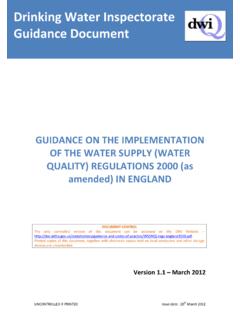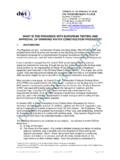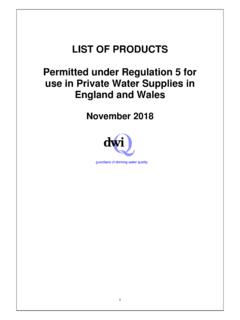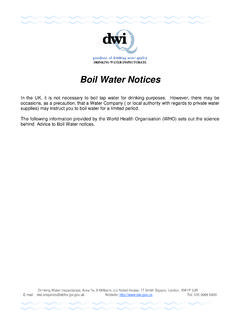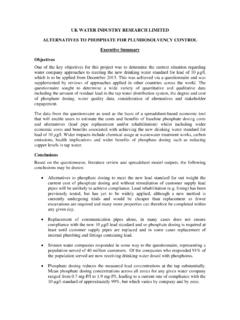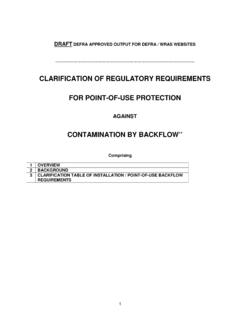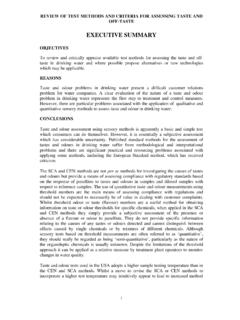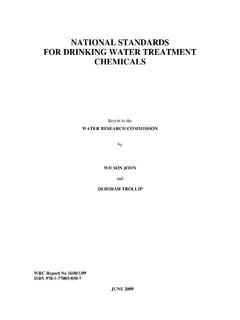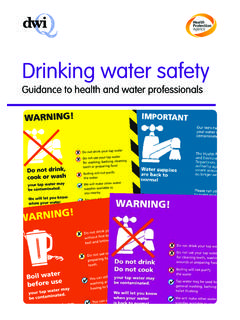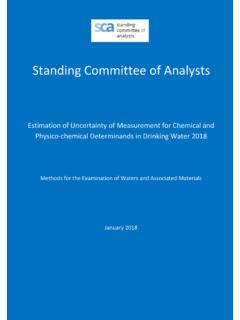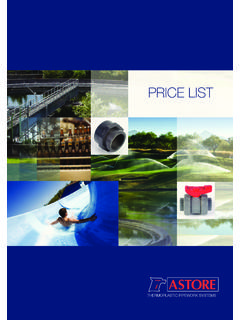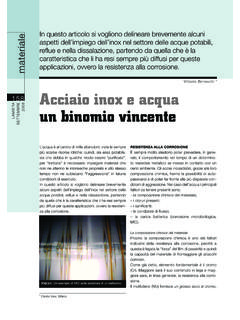Transcription of DRINKING WATER INSPECTORATE Chlorine - DWI, UK
1 DRINKING WATER INSPECTORATE , Area 7e, 9 Millbank, c/o Nobel House, 17 Smith Square, London, SW1P 3JR E-mail: W ebsi te: Tel: 030 0068 6400 DRINKING WATER INSPECTORATE Chlorine What is Chlorine ? Chlorine is the most widely used disinfectant in the home. It is also disinfectant used by the WATER industry to maintain hygienic conditions within the public WATER supply network of pipes. At the very low levels used in DRINKING WATER it is perfectly safe. Much higher concentrations are routinely used safely for other purposes such as sterilisers for baby feeding bottles and by the leisure and health care industry in spas, hydrotherapy pools and swimming pools. The reason why Chlorine can be a concern in DRINKING WATER relates to the fact that some people can be very sensitive to its taste and smell.
2 The following information explains why you may notice a Chlorine taste or smell in your DRINKING WATER and what you can do if you are particularly sensitive. What do I do if I notice the Chlorine in my WATER ? The level of Chlorine in tap WATER is very low in England and Wales which contrasts very favourably with practices in other countries where much higher levels are common. Typically WATER companies keep the level of residual disinfectant in the form of free or combined Chlorine to mg/l or less. However sometimes during maintenance of the pipe network higher levels are needed. If you occasionally notice a slight taste or smell of Chlorine it is probably due to maintenance work in your area, it will not be a long lasting problem and there is no cause to worry.
3 BUT, if you notice a particularly bad or strong smell or TCP like taste which makes your tap WATER unpalatable, or you notice a smell or taste for the first time which does not go away in a short time, then you should contact your WATER company immediately. Enquiry and emergency numbers are listed under WATER in your telephone directory or on the back of your WATER bill. Why use Chlorine ? WATER is safe when it leaves the treatment works and the trace of Chlorine is there only to preserve the high quality of the WATER as it passes through the miles of pipes used to convey WATER to homes and workplaces. Chlorine has a long history of about 100 years of safe use for hygiene purposes worldwide.
4 Why can I taste or smell Chlorine in my WATER ? There can be minor variations in the amount and the form of the Chlorine present in each WATER supp ly. WATER companies set the levels as part of the safe management of the whole network. DRINKING WATER INSPECTORATE , Area 7e, 9 Millbank, c/o Nobel House, 17 Smith Square, London, SW1P 3JR E-mail: W ebsi te: Tel: 030 0068 6400 For this reason if your property is located near to the WATER treatment works the level of Chlorine may be a little higher in your tap WATER than it is at properties several miles further away. WATER companies are required to have in place a residual disinfectant management policy designed to ensure a minimum level at the remotest part of the network whilst also ensuring the maximum level is still acceptable to all consumers.
5 The operation of a WATER distribution network is a complex task and occasionally levels of Chlorine are not optimal. If you do not like the smell or taste then a simple way to remedy the problem is to cool the tap WATER before using it for drinks. Place a jug with a lid in your fridge for a short period but always remember to throw away any unused WATER after 24 hours and clean the jug regularly. Are these low amounts of Chlorine harmful? No. The World Health Organisation has set a health based guideline maximum value of 5 mg/l for Chlorine as a residual disinfectant in DRINKING WATER . The levels in tap WATER in England and Wales are well below this guideline and most WATER companies aim to keep the level below 1 mg/l.
6 Your WATER company will provide you with a free WATER quality report showing the maximum and minimum level of residual Chlorine in your local WATER supply on request. You can also look up minimum and maximum levels of residual Chlorine in WATER supplied by each WATER company on our website here. What else can I do if I am sensitive to tastes or smells? Cooling tap WATER in the fridge is all that is needed. However, if you wish you could always try using a simple jug filter with an activated carbon cartridge. If you do decide to use a filter, or you have a modern fridge which has an integral WATER judge fitted, then you must follow all the manufacturer's instructions carefully. Not doing so can give rise to contamination and hygiene problems.
7 You can find more advice on WATER filters here. Always use freshly drawn WATER for DRINKING or cooking, taking it from a cold WATER tap supplied directly off the WATER mains. This is nearly always the cold tap in your kitchen. When no WATER has been used in the house for several hours, draw off a washing up bowlful before using WATER for DRINKING . This will ensure that you do not drink WATER which may have been standing for a long time in your pipes. Do not use hot WATER or WATER from your bathroom taps for DRINKING or cooking because it usually comes from a storage tank in the loft and is not as fresh or as safe as WATER directly from the mains. If you notice a particularly bad or strong smell or TCP like taste which means you cannot drink the WATER then this may indicate a problem with your home plumbing arrangements and you should contact your WATER company so they can investigate and give you advice on how DRINKING WATER INSPECTORATE , Area 7e, 9 Millbank, c/o Nobel House, 17 Smith Square, London, SW1P 3JR E-mail: W ebsi te: Tel: 030 0068 6400 to improve your plumbing arrangements.
8 A common cause of TCP like tastes is the hoses that are used to connect domestic appliances to the WATER supply. Some plastic kettles and anti-splash devices fitted to or inside modern taps may also be the cause. Last updated: January 2010
